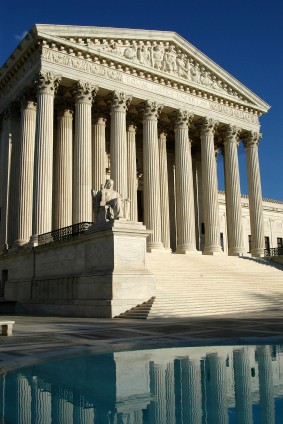-
Read more
In the previous blog post, we discussed the ongoing bankruptcy litigation between Crystal Cathedral Ministries and its founder Dr. Robert Schuller over the rejection of his Transition Agreement. That contract purported to spell out the relationship between the parties as Dr. Schuller stepped aside from his post as senior pastor. The determination of whether that agreement was intended to be an employment agreement, and subject to the strict limitations of section 502(b)(7), or a retirement benefit which is not so limited, is pending before the Supreme Court. However, Dr. Schuller’s case also presented other interesting issues that could be instructive for other employers.
In addition to his claim for damages based on the rejection of the Transition Agreement, Dr. Schuller sought compensation from tCrystal Cathedral (the bankruptcy debtor) in an undetermined amount, for allegedly improper use of his intellectual property. The intellectual property, which consisted of more than 35 years of books, sermons and other writings, had been produced by Dr. Schuller while he was employed by the debtor as its senior pastor. Dr. Schuller, individually and through a wholly owned corporation, asserted a copyright to these materials. Under the Transition Agreement between the debtor and Dr. Schuller, the intellectual property was made available to the debtor for use pursuant to a royalty free license.
-
 Read more
Read moreTransition for corporate leadership is frequently complex. When the transition involves a charismatic founder, this step can be even more stressful. Planning well in advance for the inevitable segue between leaders and outlining the respective roles of both new and departing management can help, but may not fully resolve the issues. A recent decision involving Crystal Cathedral Ministries, the megachurch founded by famed televangelist Dr. Robert H. Schuller, reflects how nuanced this process can be. Because this case presents many issues of corporate succession, it provides a gateway for discussing various employment issues that may crop up in a corporate reorganization. We will focus on the case in a series of articles designed to spotlight these issues.
Dr. Schuller founded the Crystal Cathedral in the 1950s. Later, Crystal Cathedral Ministries was formally incorporated in 1970 with Dr. Schuller as the senior pastor. During his 36-year tenure in this position, Dr. Schuller wrote numerous books and gave countless sermons and other talks, particularly in his role as the executive creator and director of content for The Hour of Power, a weekly television show produced by Crystal Cathedral Ministries. In exchange for these services, Dr. Schuller received a salary and benefits, including a housing allowance and health insurance.
-
 Read more
Read moreWhen Dodd-Frank became law in 2010, companies with corporate compliance programs viewed the whistleblower provisions warily and anticipated a potential negative impact on the success of their own internal reporting programs. According to a Law360 piece authored by Vinson & Elkins partner Amy Riella, some companies feared that employees would circumvent the internal reporting process in favor of taking information directly to the SEC to reap the financial awards. A related fear was that corporate officers would be incentivized to do the same as they learned of misconduct through compliance channels. The SEC sought to allay these concerns by creating implementation regulations that disallowed corporate officers from bringing actions when they learned of the relevant information through the role they played in the compliance process. In other words, the officer would have to learn of the fraudulent activity through his or her own “independent knowledge or independent analysis.” There is an important exception to this rule – an exception that recently earned a former company officer a six-figure award for reporting securities fraud. The exception states that once the company becomes aware of the issue, it has 120 days to address the alleged misconduct. If the company fails to act within the allotted time frame, the door opens for the otherwise ineligible corporate officer to use the second-hand information to become the corporate whistleblower.
Like sands through the hourglass, so are the days of testimony in the Pao/Kleiner Perkins sexism trial. This week’s installment pitted one female venture capitalist against another. Mary Meeker, the top-ranking female partner at Kleiner Perkins, testified to the virtues of Kleiner Perkins and her belief in its fair treatment of women. When gender is a fundamental issue, the testimony of one woman’s experience versus the other can prove pivotal. According to Fortune, Ms. Meeker, a well-known investor who was once dubbed “Queen of the Net,” by Barron’s Magazine, offered a perspective designed to undercut the claims of discrimination advanced by Pao in the previous weeks’ testimony. According to USA Today, Ms. Meeker testified that "Kleiner Perkins is the best place to be a woman in the business." That said, high-ranking women are a minority in the firm and their representation in the senior partnership has remained relatively constant. Kleiner Perkins has seven senior partners, two of whom are women. At the time of Ms. Pao’s termination in October 2012, three of the eleven senior partners were women.
-
 Read more
Read moreThe ongoing trial in Ellen Pao v. Kleiner Perkins Caufield and Byers has made headline news across the country. It’s being covered by the Wall Street Journal and USA Today, among other national publications. Those interested in following the trial can monitor the #ellenpao hashtag on Twitter, or watch liveblogs from Re/code or the San Jose Mercury-News.
Why is the trial so newsworthy? As we reported here, Pao claims that Kleiner Perkins, a prominent Silicon Valley venture capital firm, discriminated against her because of her gender and then retaliated because she complained. She claims that she was not promoted to a plum senior partner position because she was a woman, and that the firm fired her because she complained and later sued it. Her story involves sex, boorish behavior, and office intrigue that ranges from the mundane to the highly dramatic.
With that introduction, here are some -- of many -- takeaways for employers from what has transpired thus far:
-
 Read more
Read moreShould executives include an arbitration clause in their employment contracts? There’s no uniform answer, of course. Arbitration proponents cite its speed, cost, privacy, informality, minimal discovery, and limited appellate rights. Opponents cite pretty much the same list. Volumes have been written about whether arbitration is a better form of dispute resolution than litigation, and we can’t resolve that question here.
But thanks to relatively new state laws requiring public disclosure of certain arbitration information, we can look at the question statistically. Even better, people who understand statistics can look at the question statistically, and we can report what they say.
We started by looking at the data set disclosed by the American Arbitration Association (AAA) concerning employment-based arbitrations. (A detailed explanation of the data, and the data itself, is available on this page of the AAA’s website.) One field of the data reports the employee’s salary in four categories: $250,000 or greater; $100,000 to $250,000; $0 to $100,000; and, regrettably, “not provided by parties.” Over the past five years, the AAA database reports about 7700 employment arbitrations (not necessarily separate “cases”; some cases have multiple records, usually reflecting multiple respondents), but only 2912 of these included data for the employee’s salary range. The following table shows the breakout of records by salary range:
Emp. Salary
Number
Pct of Total
$0 to $100,000
2284
78.4
$100,000 to $250,000
412
14.1
$250,000+
216
7.4
Total (excl. no data)
2912
100.0
-
Read more
LSU is used to battling with its Southeastern Conference (SEC) foes on the gridiron. Now, it’s fighting in court with a former assistant who jumped ship to conference rival Texas A&M.
John Chavis, LSU’s ballyhooed former defensive coordinator, left LSU for A&M at the beginning of this year, sparking headlines about “winning big” at his new home in College Station. But storm clouds were brewing – LSU’s athletic director, Joe Alleva, said that he expected Chavis to comply with a $400,000 contractual buyout.
On February 27, Chavis sued LSU in Texas state court, seeking to avoid the buyout. He named A&M as a defendant as well, but only as an “indispensable party,” reported Jerry Hinnen of cbssports.com. The Associated Press reported that A&M agreed to pay the buyout for Chavis if he was found to owe it.
LSU, seeking a home field against Chavis, quickly filed a separate case against him in Baton Rouge, claiming that it is entitled to receive the buyout money.
Chavis’s contract reportedly said that if Chavis left in the first 11 months of his contract, before January 31, 2015, he would have to pay the buyout. The sequence of events appears to be that Chavis gave a required 30-day notice on January 5 that he was resigning and terminating his contract. Chavis says that he left LSU by February 4 – after the January 31 end to the buyout period – and didn’t join the Aggie payroll until February 13.
-
 Read more
Read moreCraig Watts, a chicken farmer from North Carolina, recently brought a whistleblower complaint against Perdue, claiming that the poultry seller retaliated against him for bringing certain animal welfare claims to light. Mr. Watts owns the farm on which the chickens are raised, but, according to the Government Accountability Project, the terms and conditions of the farm operations are strictly governed by the poultry giant. The Food Integrity Campaign (a program operated by the Government Accountability Project) filed the action on behalf of Mr. Watts, defending his right to speak out about the conditions on the farm, which Watts claims run far “afowl” of Perdue’s marketing claims of “cage-free” and “humanely-raised” chickens. After publicizing the conditions on his farm, Watts was placed on a performance improvement plan and is routinely subjected to surprise audits of his farm.
A former executive at L.A.’s Fashion Institute of Design and Merchandising is seeing red over the school’s termination of her employment, which allegedly came after she demanded more diverse branding in the school’s publications. Tamar Rosenthal filed a civil rights complaint in Los Angeles Superior Court alleging that the school, seemingly interested only in shades of white, opposed her attempts to showcase student diversity on the website and explicitly advised her not to showcase gay, black or non-white students in any school publications. According to My News LA, the complaint further alleged that Ms. Rosenthal’s supervisors created an “ultra-conservative, anti-Arab and anti-Muslim political atmosphere in the school’s front office.”
-
 Read more
Read moreYesterday, the Supreme Court heard argument in the religious discrimination case of EEOC v. Abercrombie & Fitch Stores, Inc., which made our list as one of our five issues to watch for 2015. The case arises under Title VII, the federal law that makes it illegal for an employer “to discriminate against any individual with respect to h[er] compensation, terms, conditions, or privileges of employment, because of such individual’s . . . religion.” The EEOC alleges that Abercrombie, purveyor of “authentic American clothing,” discriminated against Samantha Elauf on religious grounds. The company refused to hire Elauf because she wore a headscarf, or hijab, to her job interview, and the company’s “Look Policy” prohibited employees from wearing “caps.”
In earlier depositions in the case, Elauf’s interviewer at Abercrombie testified that she “assumed that [Elauf] was Muslim,” and “figured that was the religious reason why she wore her head scarf.” The interviewer said that she went to her district manager to discuss the headscarf issue, and told him that “[Elauf] wears the head scarf for religious reasons, I believe.” The interviewer testified that the district manager then told her not to hire Elauf because of the headscarf and said, “[S]omeone can come in and paint themselves green and say they were doing it for religious reasons, and we can’t hire them.” As a result, the interviewer lowered Elauf’s “appearance” score on her evaluation, and Elauf didn’t get the job.
Despite this testimony, the Tenth Circuit still entered summary judgment for Abercrombie, holding that the EEOC’s discrimination claim could not proceed to trial because Elauf “never informed Abercrombie prior to its hiring decision that she wore her headscarf or ‘hijab’ for religious reasons and that she needed an accommodation for that practice, due to a conflict between the practice and Abercrombie’s clothing policy.”
The fact that the Tenth Circuit granted summary judgment, even though the interviewer admitted that she assumed that Elauf wore the scarf for religious reasons, helps explain the concerns, and potential solutions, that the Justices raised in yesterday’s argument.
-
 Read more
Read moreSection 304 of the Sarbanes-Oxley Act of 2002 requires the CEO and CFO of an issuer that has restated its financial statements to reimburse the company for any incentive or equity-based compensation, and for the profits on any stock sales of the company’s stock, during the 12-month period following the first issuance of the offending financial statements. Although this provision has been used sparingly by the SEC, the recent settlement of SEC investigatory charges by Saba Software, in which executives who were not charged with any wrongdoing agreed to repay bonuses and stock profits, is a cautionary tale for CEOs and CFOs of publicly traded companies.
Saba Software became the subject of an SEC investigation and enforcement action arising out of an alleged scheme to overstate revenues by overbooking and pre-booking time statements of international consultants in order to meet pre-arranged time estimates. As part of the settlement of the SEC charges in the fall of 2014, Saba was required to restate its financial records for the years 2009 through part of 2012. In a contemporaneous settlement, Saba’s CEO agreed to reimburse the company for over $2.5 million in incentive and equity compensation and profits from stock sales earned following the issuance of the financial statements the company restated. http://www.sec.gov/News/PressRelease/Detail/PressRelease/1370543035992#.VOtSdC6LXfc.
-
 Read more
Read moreSilicon Valley is buzzing about the trial in Ellen Pao v. Kleiner Perkins Caufield and Byers LLP, which got underway on Tuesday. According to USA Today, a UC-Berkeley professor says that you “can’t be within a stone’s throw of the Valley without hearing” about the case.
The cast of characters (described here by the San Francisco Business Times) includes a number of heavy hitters, including Pao herself. Pao, a graduate of Princeton, Harvard Law, and Harvard Business School, is now the CEO of Reddit. Kleiner Perkins is a well-known venture capital firm in Menlo Park, a city that has been described as the “center of the venture capital universe.”
Pao’s allegations are explosive. She contends that she had a brief affair with a married junior partner who continued to harass her after she broke off their relationship. Her claims about the firm go deeper than just this harassment; she contends that the firm had an overarching culture of discrimination against women, culminating in her dismissal in October 2012.
As the regulatory and business environments in which our clients operate grow increasingly complex, we identify and offer perspectives on significant legal developments affecting businesses, organizations, and individuals. Each post aims to address timely issues and trends by evaluating impactful decisions, sharing observations of key enforcement changes, or distilling best practices drawn from experience. InsightZS also features personal interest pieces about the impact of our legal work in our communities and about associate life at Zuckerman Spaeder.
Information provided on InsightZS should not be considered legal advice and expressed views are those of the authors alone. Readers should seek specific legal guidance before acting in any particular circumstance.
Contributing Editors

John J. Connolly
Partner
Email | +1 410.949.1149

Andrew N. Goldfarb
Partner
Email | +1 202.778.1822

Sara Alpert Lawson
Partner
Email | +1 410.949.1181

Nicholas M. DiCarlo
Associate
Email | +1 202.778.1835




